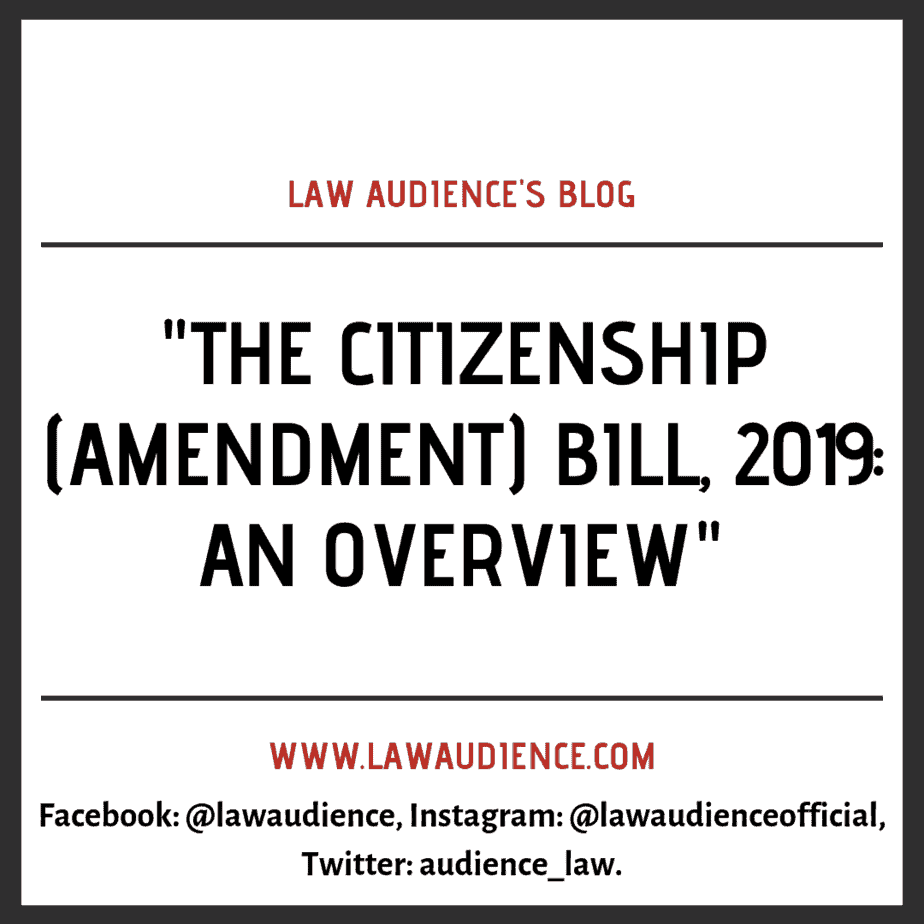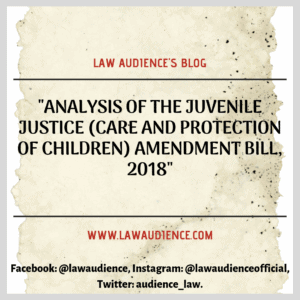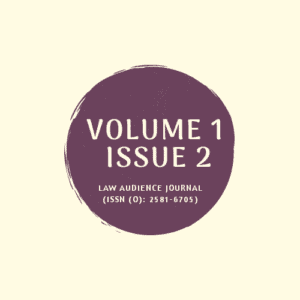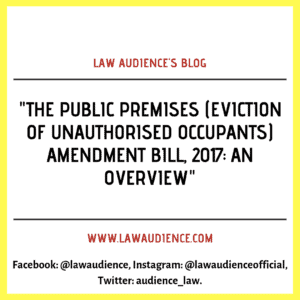I. INTRODUCTION:
THE CITIZENSHIP (AMENDMENT) BILL, 2019 (prior to the submission of report of Joint Parliamentary Committee it was introduced as The Citizenship (Amendment) Bill, 2016), was introduced in the Lok Sabha as on 19th June 2016 and it was referred to a Joint Parliamentary Committee as on 12th August 2016 and the Joint Parliamentary Committee submitted its report to Lok Sabha as on 7th January 2019.
The Joint Parliamentary Committee was headed by Shri Rajendra Agrawal (a member of Lok Sabha). The Committee submitted its report along with the fresh Citizenship Bill, after considering the report and suggestions submitted by the Committee the Lok Sabha passed the bill as “The Citizenship (Amendment) Bill, 2019” as on 8th January 2019.
This article will analyse The Citizenship (Amendment) Bill, 2019, the said bill is aimed at bringing a few amendments to “The Citizenship Act, 1955”.
II. AMENDMENTS INTRODUCED BY THE 2019 BILL IN THE 2016 BILL:
As discussed above the 2019 bill was passed by the Lok Sabha as on 08th Jan 2019 and the said bill introduced certain modifications in the 2016 bill. The amendments introduced by the 2019 bill in the 2016 bill are as follows:
a) A new proviso has been added in section 2(1) after clause b of the Principal Act (The Citizenship Act, 1955) which was not introduced by the 2016 bill. The new proviso reads as follows:
“After the Commencement of The Citizenship (Amendment) Act, 2019, proceedings or disputes of any nature against any person mentioned in the first proviso (the first proviso has also been introduced by the 2016 bill and earlier it was not present in the Principal Act)[1] shall be cancelled and such person shall become eligible to acquire Indian Citizenship by way of Naturalisation under section 6 of The Principal Act[2].”
b) A new proviso has been inserted in Section 7D after clause (f). The said proviso read as follows:
“Registration of Overseas Citizens of India Cardholder shall not be cancelled under this section unless the said citizens have been given a proper chance of being heard[3].”
III. AMENDMENTS PROPOSED BY THE BILL:
The said bill proposed the following amendments to the Principal Act, i.e., The Citizenship Act, 1955, namely:
a) Amendment of Section 2(1), After Clause B, of The Citizenship Act, 1955:
(i) Two provisos have been added by the bill namely; first proviso allows the unlawful migrants, who have been excluded by the Central Government or excluded under the Passport (Entry into India) Act, 1920 or under the Foreigners Act, 1946, belonging to the six particular minority communities namely, Hindus, Sikhs, Buddhists, Jains, Parsis and Christians from 3 particular countries namely, Afghanistan, Bangladesh and Pakistan, to apply for the Indian Citizenship under the Principal Act[4].
Basically, the first proviso says that such persons excluded under the Passport (Entry into India) Act, 1920 or from the application of the provisions of the Foreigners Act, 1946, shall not be regarded as illegal migrants for this purpose of this Act.
(ii) Second Proviso says that after the enactment of the Citizenship (Amendment) Act, 2019, all the disputes or proceedings against any person mentioned in the first proviso shall stand cancelled and they will become eligible to apply for the Indian Citizenship by way of Naturalisation under section 6 of the Principal Act[5].
b) Amendment of Section 7D, After Clauses D & F, of The Citizenship Act, 1955:
(i) One new clause and one new proviso have been added by the said bill. Clause (da) allows the Government to cancel or to terminate the registration of the overseas citizens of Indian Cardholder if they violate any provision or rule of this Act or of any other Act or Law for the time being in force[6].
(ii) A new proviso has been added after Clause (f) of Section 7D. This proviso maintains a check on the power of the Government granted under Clause (da) of Section 7D. This proviso says that the Government cannot terminate the registration of overseas citizens of Indian Cardholder without providing them with a proper chance of being heard[7].
c) Amendment of Third Schedule Clause (d), The Citizenship Act, 1955:
Under this amendment, the period has been reduced to 6 years from 11 years[8].
IV. PURPOSE OF AMENDMENTS:
(i) Purpose of Amending Section 2(1), After Clause B, of The Citizenship Act, 1955:
As per the report submitted by the Joint Parliamentary Committee to Lok Sabha the main aim of this particular amendment is to allow the minority communities to acquire Indian Citizenship under the Principal Act[9].
Another justification submitted by the committee is that these particular minority committees were forced to establish their shelters in India due to religious harassment in their own countries[10].
So for the upliftment of these minority communities, this amendment has been introduced.
(ii) Purpose of Amending Section 7D, After Clauses D & F, of The Citizenship Act, 1955:
The Committee in its report submitted that the foremost factor of amending Section 7D of the Principal Act is to terminate or to cancel the registration of overseas citizens of Indian Cardholder-only if they violate any provision of this Act or of any other law for the time being in the force[11].
According to the committee, it will maintain a check on the acts done by the Oversea Citizens of India (hereinafter referred to as OCIs). The committee also submitted in its report that in the Principal Act there is no such provision to cancel the registration of OCIs. Thus, it was necessary to authorize the Central Government to terminate the registration of OCIs (if they violate any law of this Act or of nay Law as the case may be) and this point of view was also supported by the Ministry of External Affairs[12].
(iii) Purpose of Amending Third Schedule Clause (d), The Citizenship Act, 1955:
According to the Committee, the purpose of this amendment is to enable the minority communities from Afghanistan, Bangladesh and Pakistan to apply for the Indian Citizenship under the Principal Act[13].
These minor communities must have migrated to India and is not able to provide the required valid documents in support of their claim. After the amendment, the above-mentioned minority communities can apply for Indian Citizenship by way of Naturalisation under Sec 6 of the Principal Act.
As per the report submitted by the Joint Parliamentary Committee to the Lok Sabha it has been admitted that the main purpose of amending the 3rd Schedule is to reduce the time period qualifications for the above-mentioned minority communities[14].
V. ARGUMENTS AGAINST THE BILL:
The bill after getting passed by the Lok Sabha has been criticized on numerous grounds. But, however, the most highlighted factor is that the bill violates the basic structure and basic provisions of the Indian Constitution. It is said that the amendment of Section 2(1) after clause (b) is based on Caste Discrimination and is violative of Article 14 of the Indian Constitution.
Even in the report of Joint Parliamentary Committee, it is mentioned that the Constitutional specialists believe that the said bill will be violative of Articles 14 & 25 if we still continue the use of the following words in the bill namely, Hindus, Parsis and Sikhs etc.
The Ministry of Law and Justice has denied the above-mentioned contention of the Constitutional Experts and has submitted in the report of Joint Parliamentary Committee as follows:
“”The proposed Amendment Bill may not violate the spirit of Article 14, as mentioned earlier, as it upholds the test of reasonable classification as propounded by a seven Judge Bench in the State of West Bengal Vs. Anwar Ali Sarkar[15]. Based on the clear classification adopted in the Bill, which is clear and substantial, there are sufficient reasons for making the distinction. There can be no element of arbitrariness in the classification proposed by virtue of these just reasons. With regard to Article 25, the proposed Amendment Bill does not, in anyway, affect the right of any person to freely profess, practice and propagate religion in the country.[16]“
VI. PROTEST AGAINST THE BILL:
The protest against the bill has been going on since the approval by the Lok Sabha. We’re witnessing a new event or protest every day regarding the bill in various communities such as Manipur[17], Meghalaya[18], Tripura[19] and Assam[20].
There are certain reports stating that even the opposition is planning to vote against the Citizenship Bill in the Rajya Sabha[21]. It has also been alleged that the ruling Government is doing this to achieve the political goals and to secure more minority votes in the 2019 Elections.
VII. CONCLUSION:
The bill is yet to be passed by the Rajya Sabha. On the other hand, many groups, communities, associations and other parties, protesting against it and saying that the bill must not be passed by the Rajya Sabha. It has also been alleged that if it is passed by the Rajya Sabha then many minority communities from Assam will lose their political rights.
Some associations questioned the intention of the authorities behind the inclusion of 3 particular countries. In support of the bill, it is said that the bill is a good move to give a justified treatment to those who have been migrated to India because of numerous causes such as harassment and cruelty etc., must be given a fair chance to earn a livelihood on the longtime permit.
The report submitted by the Joint parliamentary committee in the Lok Sabha has denied all the negative factors opposing the bill. A few changes have been brought up in the 2016 bill by the way of 2019 bill and the same changes have been discussed in this article. The report has also justified all the amendments.
Now, the eyes of the whole country are on the Rajya Sabha whether it passes it or not.
NOTE: The bill lapsed due to the dissolution of 16th Lok Sabha.
[1] FIRST PROVISO OF SECTION 2(1) AFTER CLAUSE B OF THE PRINCIPAL ACT AS INSERTED BY THE CITIZENSHIP (AMENDMENT) BILL 2016: “Provided that persons belonging to minority communities, namely, Hindus, Sikhs, Buddhists, Jains, Parsis and Christians from Afghanistan, Bangladesh and Pakistan, who have been exempted by the Central Government by or under clause (c) of sub-section (2) of section 3 of the Passport (Entry into India) Act, 1920 or from the application of the provisions of the Foreigners Act, 1946 or any order made thereunder, shall not be treated as illegal migrants for the purposes of that Act.
[2] New proviso inserted in Section 2(1) after clause b of the Principal Act by the Citizenship (Amendment) Bill, 2019.
[3] Proviso has been inserted by the Citizenship (Amendment) Bill, 2019.
[4] supra note 1.
[5] supra note 2.
[6] Amendment of Section 7D, The Citizenship (Amendment) Bill, 2019.
[7] Ibid.
[8] Amendment Of 3rd Schedule As Per The Citizenship Bill, 2019:
“Provided that for the persons belonging to minority communities, namely, Hindus, Sikhs, Buddhists, Jains, Parsis and Christians from Afghanistan, Bangladesh and Pakistan, the aggregate period of residence or service of a Government in India as required under this clause shall be read as “not less than six years” in place of “not less than eleven years”.
[9] REPORT OF THE JOINT COMMITTEE ON THE CITIZENSHIP (AMENDMENT) BILL, 2016, (Jan. 25, 2019, 10:00 PM) http://164.100.47.193/lsscommittee/Joint%20Committee%20on%20Bill%20to%20amend%20the%20Citizenship%20Act,%201955/16_Joint_Committee_on_Bill_to_amend_the_Citizenship_Act_1955_1.pdf.
[10] Ibid.
[11] Ibid.
[12] Ibid.
[13] Ibid.
[14] Ibid.
[15] A.I.R. 1952 S.C. 75 (India).
[16] supra note 9.
[17] https://www.news18.com/news/india/demonstrations-held-across-manipur-against-citizenship-bill-after-66-organisations-call-for-24-hour-strike-2020179.html.
[18] https://www.ndtv.com/india-news/thousands-protest-against-citizenship-bill-in-meghalaya-1986228.
[19] http://www.uniindia.com/tripura-cpm-to-hold-protest-against-citizenship-amendment-bill-on-feb-4/east/news/1484807.html.
[20] https://www.thehindu.com/news/national/assam-employees-join-anti-citizenship-bill-stir/article26133135.ece.
[21] https://timesofindia.indiatimes.com/india/congress-to-vote-against-citizenship-amendment-bill-in-rs/articleshow/67762393.cms.




